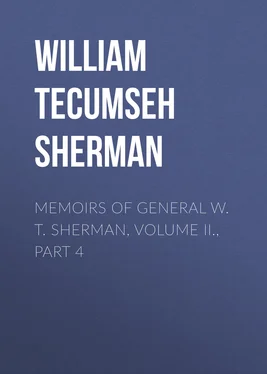William Tecumseh Sherman - Memoirs of General W. T. Sherman, Volume II., Part 4
Здесь есть возможность читать онлайн «William Tecumseh Sherman - Memoirs of General W. T. Sherman, Volume II., Part 4» — ознакомительный отрывок электронной книги совершенно бесплатно, а после прочтения отрывка купить полную версию. В некоторых случаях можно слушать аудио, скачать через торрент в формате fb2 и присутствует краткое содержание. Жанр: Биографии и Мемуары, История, foreign_edu, foreign_antique, foreign_prose, на английском языке. Описание произведения, (предисловие) а так же отзывы посетителей доступны на портале библиотеки ЛибКат.
- Название:Memoirs of General W. T. Sherman, Volume II., Part 4
- Автор:
- Жанр:
- Год:неизвестен
- ISBN:нет данных
- Рейтинг книги:5 / 5. Голосов: 1
-
Избранное:Добавить в избранное
- Отзывы:
-
Ваша оценка:
- 100
- 1
- 2
- 3
- 4
- 5
Memoirs of General W. T. Sherman, Volume II., Part 4: краткое содержание, описание и аннотация
Предлагаем к чтению аннотацию, описание, краткое содержание или предисловие (зависит от того, что написал сам автор книги «Memoirs of General W. T. Sherman, Volume II., Part 4»). Если вы не нашли необходимую информацию о книге — напишите в комментариях, мы постараемся отыскать её.
Memoirs of General W. T. Sherman, Volume II., Part 4 — читать онлайн ознакомительный отрывок
Ниже представлен текст книги, разбитый по страницам. Система сохранения места последней прочитанной страницы, позволяет с удобством читать онлайн бесплатно книгу «Memoirs of General W. T. Sherman, Volume II., Part 4», без необходимости каждый раз заново искать на чём Вы остановились. Поставьте закладку, и сможете в любой момент перейти на страницу, на которой закончили чтение.
Интервал:
Закладка:
William T. Sherman
The Memoirs of General W. T. Sherman, Volume II., Part 4
CHAPTER XXI
On the 12th of November the railroad and telegraph communications with the rear were broken, and the army stood detached from all friends, dependent on its own resources and supplies. No time was to be lost; all the detachments were ordered to march rapidly for Atlanta, breaking up the railroad en route, and generally to so damage the country as to make it untenable to the enemy. By the 14th all the troops had arrived at or near Atlanta, and were, according to orders, grouped into two wings, the right and left, commanded respectively by Major-Generals O. O. Howard and H. W. Slocum, both comparatively young men, but educated and experienced officers, fully competent to their command.
The right wing was composed of the Fifteenth Corps, Major-General P. J. Osterhaus commanding, and the Seventeenth Corps, Major-General Frank P. Blair commanding.
The left wing was composed of the Fourteenth Corps, Major-General Jefferson C. Davis commanding, and the Twentieth Corps, Brigadier-General A. S. Williams commanding.
The Fifteenth Corps had four divisions, commanded by Brigadier-Generals Charles R. Woods, W. B. Hazen, John E. Smith, and John M. Gorse.
The Seventeenth Corps had three divisions, commanded by Major-General J. A. Mower, and Brigadier-Generals M. D. Leggett ad Giles A. Smith.
The Fourteenth Corps had three divisions, commanded by Brigadier-Generals W. P. Carlin, James D. Morgan, and A. Baird.
The Twentieth Corps had also three divisions, commanded by Brigadier-Generals N. J. Jackson, John W. Geary, and W. T. Ward.
The cavalry division was held separate, subject to my own orders. It was commanded by Brigadier-General Judson Kilpatrick, and was composed of two brigades, commanded by Colonels Eli H. Murray, of Kentucky, and Smith D. Atkins, of Illinois.
The strength of the army, as officially reported, is given in the following tables, and shows an aggregate of fifty-five thousand three hundred and twenty-nine infantry, five thousand and sixty-three cavalry, and eighteen hundred and twelve artillery in all, sixty-two thousand two hundred and four officers and men.
The most extraordinary efforts had been made to purge this army of non-combatants and of sick men, for we knew well that there was to be no place of safety save with the army itself; our wagons were loaded with ammunition, provisions, and forage, and we could ill afford to haul even sick men in the ambulances, so that all on this exhibit may be assumed to have been able-bodied, experienced soldiers, well armed, well equipped and provided, as far as human foresight could, with all the essentials of life, strength, and vigorous action.
The two general orders made for this march appear to me, even at this late day, so clear, emphatic, and well-digested, that no account of that historic event is perfect without them, and I give them entire, even at the seeming appearance of repetition; and, though they called for great sacrifice and labor on the part of the officers and men, I insist that these orders were obeyed as well as any similar orders ever were, by an army operating wholly in an enemy's country, and dispersed, as we necessarily were, during the subsequent period of nearly six months.
[Special Field Orders, No. 119.]
HEADQUARTERS MILITARY DIVISION OF THE MISSISSIPPI
IN THE FIELD, KINGSTON, GEORGIA, November 8, 1864
The general commanding deems it proper at this time to inform the officers and men of the Fourteenth, Fifteenth, Seventeenth, and Twentieth Corps, that he has organized them into an army for a special purpose, well known to the War Department and to General Grant. It is sufficient for you to know that it involves a departure from our present base, and a long and difficult march to a new one. All the chances of war have been considered and provided for, as far as human sagacity can. All he asks of you is to maintain that discipline, patience, and courage, which have characterized you in the past; and he hopes, through you, to strike a blow at our enemy that will have a material effect in producing what we all so much desire, his complete overthrow. Of all things, the most important is, that the men, during marches and in camp, keep their places and do not scatter about as stragglers or foragers, to be picked up by a hostile people in detail. It is also of the utmost importance that our wagons should not be loaded with any thing but provisions and ammunition. All surplus servants, noncombatants, and refugees, should now go to the rear, and none should be encouraged to encumber us on the march. At some future time we will be able to provide for the poor whites and blacks who seek to escape the bondage under which they are now suffering. With these few simple cautions, he hopes to lead you to achievements equal in importance to those of the past.
By order of Major-General W. T. Sherman, L. M. DAYTON, Aide-de-Camp.
[Special Field Orders, No. 120.]
HEADQUARTERS MILITARY DIVISION OF THE MISSISSIPPI
IN THE FIELD, KINGSTON, GEORGIA, November 9, 1864
1. For the purpose of military operations, this army is divided into two wings viz.:
The right wing, Major-General O. O. Howard commanding, composed of the Fifteenth and Seventeenth Corps; the left wing, Major-General H. W. Slocum commanding, composed of the Fourteenth and Twentieth Corps.
2. The habitual order of march will be, wherever practicable, by four roads, as nearly parallel as possible, and converging at points hereafter to be indicated in orders. The cavalry, Brigadier-General Kilpatrick commanding, will receive special orders from the commander-in-chief.
3. There will be no general train of supplies, but each corps will have its ammunition-train and provision-train, distributed habitually as follows: Behind each regiment should follow one wagon and one ambulance; behind each brigade should follow a due proportion of ammunition-wagons, provision-wagons, and ambulances. In case of danger, each corps commander should change this order of march, by having his advance and rear brigades unencumbered by wheels. The separate columns will start habitually at 7 a.m., and make about fifteen miles per day, unless otherwise fixed in orders.
4. The army will forage liberally on the country during the march. To this end, each brigade commander will organize a good and sufficient foraging party, under the command of one or more discreet officers, who will gather, near the route traveled, corn or forage of any kind, meat of any kind, vegetables, corn-meal, or whatever is needed by the command, aiming at all times to keep in the wagons at least ten days' provisions for his command, and three days' forage. Soldiers must not enter the dwellings of the inhabitants, or commit any trespass; but, during a halt or camp, they may be permitted to gather turnips, potatoes, and other vegetables, and to drive in stock in sight of their camp. To regular foraging-parties must be intrusted the gathering of provisions and forage, at any distance from the road traveled.
6. To corps commanders alone is intrusted the power to destroy mills, houses, cotton-gins, etc.; and for them this general principle is laid down:
In districts and neighborhoods where the army is unmolested, no destruction of each property should be permitted; but should guerrillas or bushwhackers molest our march, or should the inhabitants burn bridges, obstruct roads, or otherwise manifest local hostility, then army commanders should order and enforce a devastation more or less relentless, according to the measure of such hostility.
6. As for horses, mules, wagons, etc., belonging to the inhabitants, the cavalry and artillery may appropriate freely and without limit; discriminating, however, between the rich, who are usually hostile, and the poor and industrious, usually neutral or friendly. Foraging-parties may also take mules or horses, to replace the jaded animals of their trains, or to serve as pack-mules for the regiments or brigades. In all foraging, of whatever kind, the parties engaged will refrain from abusive or threatening language, and may, where the officer in command thinks proper, give written certificates of the facts, but no receipts; and they will endeavor to leave with each family a reasonable portion for their maintenance,
Читать дальшеИнтервал:
Закладка:
Похожие книги на «Memoirs of General W. T. Sherman, Volume II., Part 4»
Представляем Вашему вниманию похожие книги на «Memoirs of General W. T. Sherman, Volume II., Part 4» списком для выбора. Мы отобрали схожую по названию и смыслу литературу в надежде предоставить читателям больше вариантов отыскать новые, интересные, ещё непрочитанные произведения.
Обсуждение, отзывы о книге «Memoirs of General W. T. Sherman, Volume II., Part 4» и просто собственные мнения читателей. Оставьте ваши комментарии, напишите, что Вы думаете о произведении, его смысле или главных героях. Укажите что конкретно понравилось, а что нет, и почему Вы так считаете.












